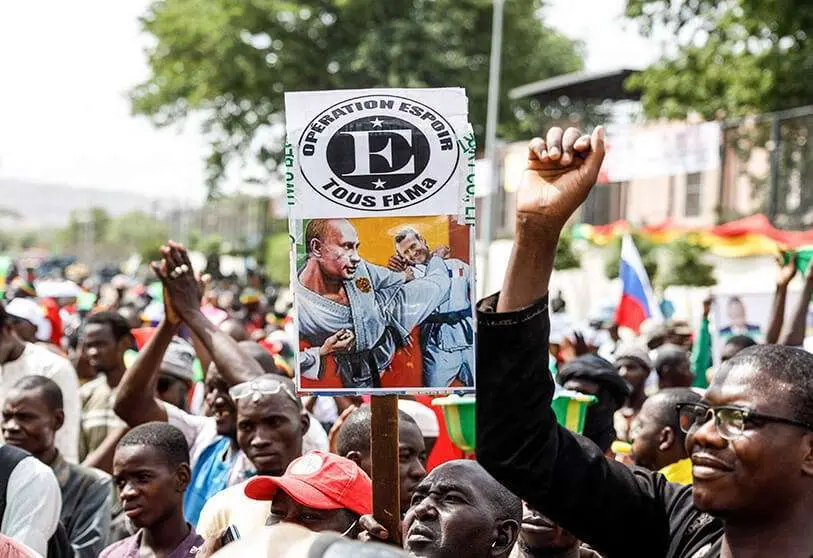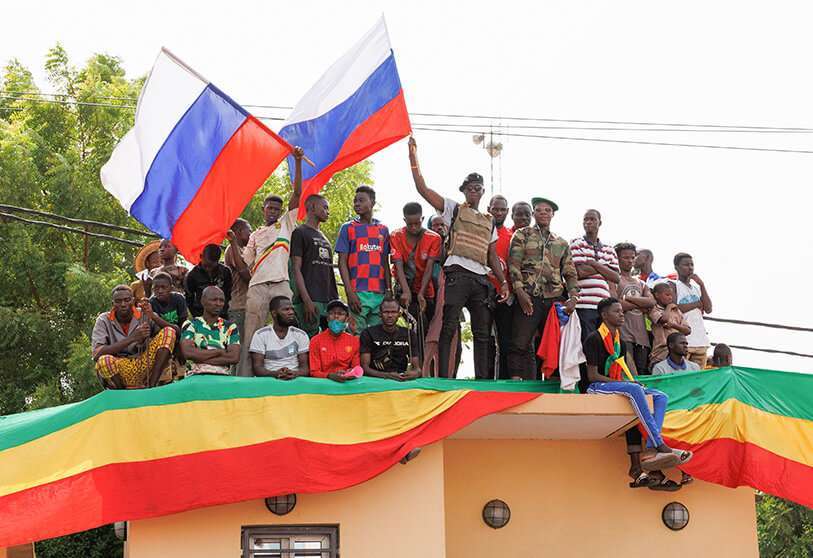Sahelian manoeuvres in the dark

In the 1980s, a British synth pop and new wave group called Orchestral Manoeuvres in the Dark (OMD) was formed. They are best known for the hit Enola Gay and their 1981 album Architecture and Morality. It appeared on television programmes in Spain, but either because of our lack of knowledge of English or the habit of translating any foreign word into Spanish, the group's name was translated into a confused Orchestral Manoeuvres in the Dark.
A parallel can be drawn between our translation of the OMD group's name and the gradual degradation that the Sahel, the much-vaunted "southern border" of Spain and the EU, is experiencing this month. Mali, the epicentre of instability in the region, is increasingly and more sharply manoeuvring against the West. Chad and Burkina Faso are experiencing a rise in anti-French sentiment, at a time when Barkhane and Takuba are relocating to both countries, which in the medium to long term may mean that both missions will experience the same situation in both countries as they did in Mali. Finally, the term Darkness does justice not only to the gloomy scenario that hangs over the region, but also to the scant coverage in the Spanish press of a region that, let us not forget, is close to us and where we have troops deployed.
On 2 May, Mali's ruling military junta denounced the defence agreements with France, which governed French military presence and aid in the country. The Malian military justified its decision by citing violations of its sovereignty by French troops. However, those following the situation understood that this excuse concealed tensions between the two sides over the junta's decision to extend the democratic "transition" to four years and postpone elections scheduled for February 2023, and the presence of Wagner Group mercenaries. Wagner is seen in opposite ways by Paris and Bamako; while for the former he represents a threat to the region's security because of his brutality and for being the Kremlin's pawns, for Mali, Wagner achieves what neither France nor the UN or the EU have been able to do in nine years: dealing with the terrorist threat swiftly and brutally without concern for human rights and civilian casualties, which is probably more in line with how the Malian army deals with the terrorist threat than with how the West does, the Moura massacre in March this year, committed by the Malian army and Wagner Group mercenaries, being a case in point.

Ten days later, the Malian junta announced that it had prevented a coup attempt by "anti-progressive officers and non-commissioned officers", supported by a Western country. This failed coup certainly undermined Bamako's shaky confidence that it could count on the West and its regional allies in the G5 Sahel to deal with the terrorist threat. Otherwise, it is difficult to explain what happened on 16 May. On that day Mali announced that it was leaving the G5 Sahel, a regional forum formed by Niger, Chad, Burkina Faso, Mauritania and Mali to coordinate the fight against terrorism. Bamako's excuse was that the other countries had denied it the rotating presidency of the group, which should have begun on 15 February. The other members argued that they did not respect Mali's will because of the political situation in Mali, ignoring the fact that Chad and Burkina Faso are also ruled by military juntas. The G5 Sahel's refusal, its Western 'allies''' hesitations on how to deal with jihadism and the harsh international, regional and continental reaction to the junta, translated into harsh economic sanctions and the ground and diplomatic isolation of Mali, most likely explain its decision to confront the jihadist threat with the help of the Wagner group's mercenaries.
These gestures further destabilise a region where terrorism is only one of the many plagues plaguing the area. Droughts threaten to create new famines in a region accustomed to such tragedies, events that are certain to result in waves of refugees and migrants who are certain to make their way to Spain, specifically the Canary Islands. The data suggest that this is already happening. So far this year, from 1 January to 15 May, 7,619 migrants have arrived on the Canary coasts, of which 995 arrived in the first 15 days of May, 52% more than in May 2021. If Wagner fails to contain the jihadist threat (and by extension the Malian army), it is very likely that a scenario like the one experienced a decade ago, the origin of the current conflict, will be repeated. In 2012, jihadist groups from Algeria and Libya took over a separatist Tuareg insurgency in northern Mali, reaching the gates of Bamako by the end of that year. They almost took the whole country had it not been for the French intervention in 2013. Ten years later we may find ourselves with a scenario like the one in Afghanistan last summer. Who knows when Bamako will fall to the jihadists? It could be in one, two, six months or a year.

If this were to happen, the consequences for the EU and Spain would be catastrophic. In addition to the harsh blow it would deal to the EU for its inability to set itself up as the guarantor of global security, there would be a more than likely second major refugee crisis equal to or worse than the Syrian crisis of 2015, with countries like Spain and Italy feeling ignored if they do not manage to distribute the large number of refugees that will arrive on their shores. In Spain, regions such as the Canary Islands, Ceuta and Melilla, gateways to Europe, will be more overwhelmed than they are in their capacity to receive immigrants, with the consequent social and economic unrest that this would cause, in addition to the political advantage that some parties would gain by promoting xenophobic discourse.
What solutions are on the horizon for such a scenario? In the short term, France is still busy moving Barkhane and Takuba from Mali to Niger, the latter being the most stable and closest to the theatre of operations (where the borders of Mali, Niger and Burkina Faso meet). However, in Niger, as in Mali, anti-French sentiment is taking hold, most likely inspired by Kremlin propaganda, the population's weariness with growing insecurity and the anti-colonialist legacy against France. This rejection of the French presence may result in the withdrawal of French troops from the country in the medium term. It should not be forgotten that one of the origins of tensions between France and Mali was the Kremlin-sponsored anti-French protests and local unease with the perceived colonialist French presence. Even in Chad - a country with a long history of French military presence and the best army in the G5 Sahel - there have also been anti-French protests, making it difficult to continue French military presence in the area.
There is talk of NATO filling the French and European vacuum, especially a month before the Madrid summit. However, it is unlikely that NATO, which is preoccupied with the Ukrainian conflict and bringing Sweden and Finland into its ranks, will take an interest in the Sahel. The Baltic states and Poland will not tolerate diversionary attention to the Russian threat to their borders in a region that is of little interest to them. France, traditionally wary of Anglo-Saxon hegemony in foreign policy, will fight to continue to lead intervention in the area, most likely within the EU framework or in a coalition under French leadership. There is talk of Spain leading efforts to reorient the Atlantic focus towards the Sahel, but given that we are one of the countries that does not meet the 2% of GDP defence commitment and the reticence towards NATO on the part of part of the coalition government, it is very unlikely that we will change the Alliance's course towards the south.
In conclusion, this month has seen the situation in the Sahel deteriorate further, even if it goes unnoticed in the media. Mali is moving further away from the West's orbit, breaking defence agreements with France, accusing the West of fomenting a coup d'état and leaving the G5 Sahel. As a result, Mali is likely to experience a scenario similar to what happened in Afghanistan last summer. Such a scenario would provoke tensions within the EU and in Spain as a result of the migration crisis that a jihadist-controlled Mali would cause, increasing the number of irregular migrants arriving in Ceuta, Melilla and the Canary Islands. The latter has experienced a considerable migratory spike in May. Finally, the French military apparatus is settling in Niger, but both there and in neighbouring Chad protests against its presence are growing, which may lead to its expulsion from both countries in the medium term. NATO is unlikely to get involved in the area, given that it is already busy enough with the Ukrainian conflict and the accession of Sweden and Finland. Spain can do little to influence this change, as it does not contribute 2% of its GDP to defence and part of the coalition government distrusts NATO.
While this is going on, the Sahel is in agony from the scourges of famine, terrorism and drought. Orchestral Manoeuvres in the Dark continue to take place there.
Bibliografía
1. Datos extraídos de “La olla a presión del Sahel gesta un alza del flujo en la ruta canaria”, La Provincia, mayo 2022, https://www.laprovincia.es/canarias/2022/05/18/olla-presion-sahel-gesta-alza-66243327.html

